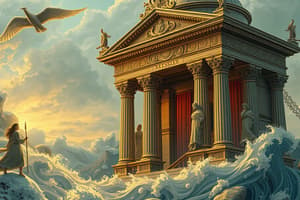Podcast
Questions and Answers
According to Plato, what is the poet's object?
According to Plato, what is the poet's object?
- To give general truths (correct)
- To escape from emotion
- To express personality
- To tell what actually happened
What did Aristotle believe about poetry and history?
What did Aristotle believe about poetry and history?
- Poetry begins in wisdom and ends in delight
- Poetry tends to give general truths, while history gives particular facts (correct)
- Poetry is less serious and scientific than history
- Poetry gives particular facts, while history gives general truths
According to Robert Frost, where does poetry begin and end?
According to Robert Frost, where does poetry begin and end?
- It begins in wisdom and ends in delight (correct)
- It begins in emotion and ends in escape
- It begins in personality and ends in emotion
- It begins in escape and ends in personality
What did T.S. Eliot say about the nature of poetry?
What did T.S. Eliot say about the nature of poetry?
According to Plato, how does poetry differ from history?
According to Plato, how does poetry differ from history?
What did Aristotle believe is the nature of poetry compared to history?
What did Aristotle believe is the nature of poetry compared to history?
Where does Robert Frost believe poetry begins and ends?
Where does Robert Frost believe poetry begins and ends?
What did T.S. Eliot say about the nature of poetry and emotion?
What did T.S. Eliot say about the nature of poetry and emotion?
Poetry is nearer to vital truth than ______
Poetry is nearer to vital truth than ______
A poet's object is not to tell what actually happened but what could or would happen either probably or ______
A poet's object is not to tell what actually happened but what could or would happen either probably or ______
Poetry begins in delight and ends in ______
Poetry begins in delight and ends in ______
Poetry is not a turning loose of emotion, but an escape from ______
Poetry is not a turning loose of emotion, but an escape from ______
Flashcards are hidden until you start studying
Study Notes
Poetry and Philosophers
- According to Plato, a poet's object is not to tell what actually happened but what could or would happen either probably or necessarily.
- Plato believed that poetry differs from history in that poetry shows what could or would happen, whereas history shows what actually happened.
Aristotle on Poetry and History
- Aristotle believed that poetry is nearer to vital truth than history.
- He believed that poetry is more philosophical and of graver import than history.
Robert Frost on Poetry
- According to Robert Frost, poetry begins in delight and ends in wisdom.
- Frost believed that poetry begins and ends with the individual.
T.S. Eliot on Poetry and Emotion
- T.S. Eliot said that poetry is not a turning loose of emotion, but an escape from emotion.
- Eliot believed that poetry is a way to transcend and transform personal emotions into a work of art.
Studying That Suits You
Use AI to generate personalized quizzes and flashcards to suit your learning preferences.




